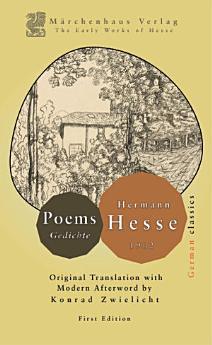Poems
The Early Works of Hermann Hesse Book 38 · Marchen Press
Ebook
163
Pages
family_home
Eligible
info
reportRatings and reviews aren’t verified Learn More
About this ebook
By 1902, Hesse had proven himself not only a prose writer but also a committed poet, and in that year he published a simply titled volume: Gedichte (“Poems”). Published first in Berlin by Verlag Wilhelm Grote, this collection gathered together a new selection of Hesse’s poetry, written in the years since Romantische Lieder, his first poetry collection. At the time of publication, Hesse was 24 and living a literary life between Basel and southern Germany, still honing his voice. The 1902 Poems collection was modest in appearance—likely a small hardbound book—and it did not make a sensational splash in the literary world. However, it did serve to consolidate Hesse’s reputation in German-speaking Europe as a young poet of promise. Some of these poems had appeared in journals, and now readers could see a fuller range of his verse in one volume. Notably, the collection reflects Hesse’s experiences and growth: in 1901 he had traveled to Italy, and those southern impressions can be felt in a few Italian landscapes sketched in verse. For Hesse, Gedichte was another stepping stone, quietly reinforcing his dual identity as both novelist and poet. Hesse’s second poetry collection refines the stylistic excesses of Romantic Songs while retaining their thematic core. The verses here adopt a more restrained cadence, their imagery drawn from Swabian folklore and medieval mysticism. Recurring motifs—wandering minstrels, autumnal harvests—evoke a pre-industrial Europe besieged by modernity’s encroachment. The collection’s restrained formalism reflects Hesse’s growing mastery of symbolic economy, though its emotional register remains tethered to youthful disillusionment. Critics often overlook Gedichte in favor of his novels, yet its disciplined lyricism reveals a poet honing his voice against the tumult of the early 20th century. The poems’ preoccupation with thresholds—dusk, doorways, riverbanks—prefigures Hesse’s later existential thresholds, their liminal spaces serving as analogues for psychological transformation. This new edition features a fresh, contemporary translation of Hesse's early work, making his philosophical, existentialist literature accessible to modern readers from the original Fraktur manuscripts. Enhanced by an illuminating Afterword focused on Hesse's personal and intellectual relationship with Carl Jung, a concise biography, a glossary of essential philosophical terms integral to his writings (his version of Jungian Psychological concepts) and a detailed chronology of his life and major works, this robust edition introduces the reader to the brilliance of his literature in context. It not only captures the depth and nuance of Hesse’s thought but also highlights its enduring impact on the debates of the mid-20th century, contemporary culture and Western Philosophy across the 20th century and into the 21st.
About the author
Herman Hesse (1877-1962) navigated a life shaped by psychological turbulence that fundamentally transformed his literary vision following his pivotal encounter with Carl Jung's analytical psychology. After suffering a severe breakdown in 1916 amid his crumbling first marriage and the ravages of World War I, Hesse underwent intensive psychoanalysis with Jung's student J.B. Lang and later with Jung himself, sessions that would profoundly alter his creative trajectory. This Jungian influence became evident in his subsequent works, particularly "Demian" and "Steppenwolf," where the protagonist's journey toward individuation—Jung's concept of integrating the conscious and unconscious aspects of personality—emerges as a central theme. Hesse's correspondence with Jung continued for decades, their intellectual relationship deepening as Hesse increasingly incorporated Jungian archetypes, dream symbolism, and the notion of the shadow self into his narratives of spiritual seeking. The writer later acknowledged that Jung's therapeutic methods had not only rescued him from psychological collapse but had fundamentally reshaped his understanding of human consciousness, enabling him to transmute his personal suffering into the allegorical quests for wholeness that characterized his most enduring works.RetryClaude can make mistakes. Please double-check responses.
Rate this ebook
Tell us what you think.
Reading information
Smartphones and tablets
Install the Google Play Books app for Android and iPad/iPhone. It syncs automatically with your account and allows you to read online or offline wherever you are.
Laptops and computers
You can listen to audiobooks purchased on Google Play using your computer's web browser.
eReaders and other devices
To read on e-ink devices like Kobo eReaders, you'll need to download a file and transfer it to your device. Follow the detailed Help Center instructions to transfer the files to supported eReaders.











